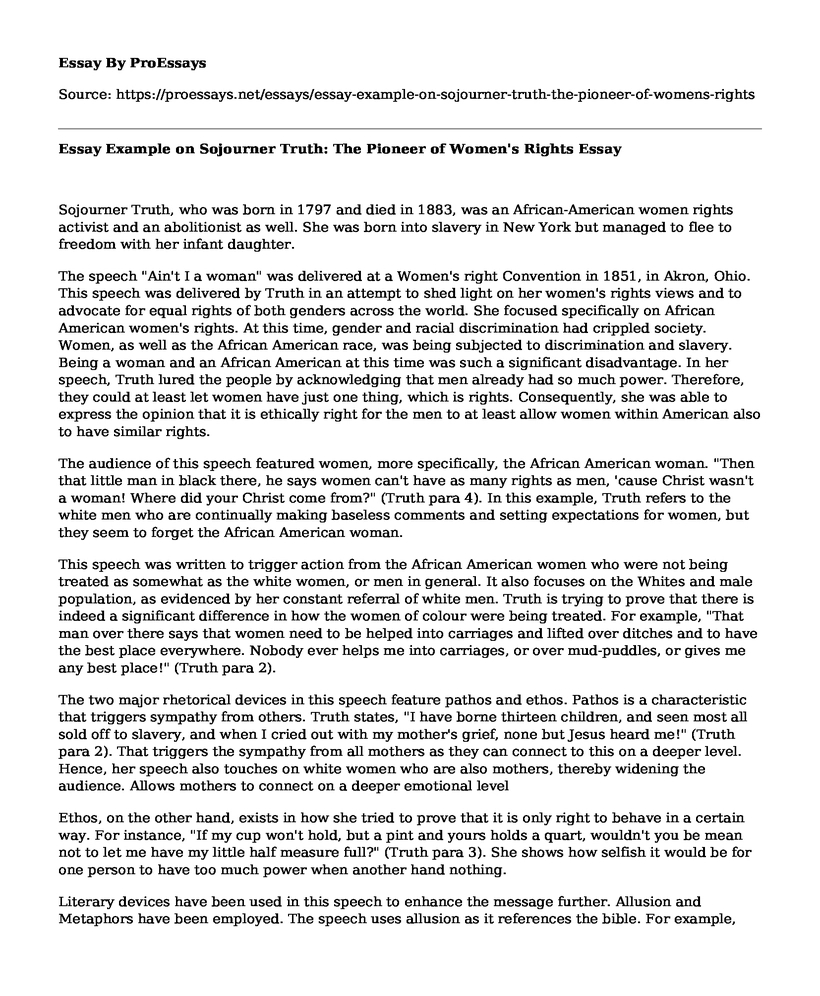Sojourner Truth, who was born in 1797 and died in 1883, was an African-American women rights activist and an abolitionist as well. She was born into slavery in New York but managed to flee to freedom with her infant daughter.
The speech "Ain't I a woman" was delivered at a Women's right Convention in 1851, in Akron, Ohio. This speech was delivered by Truth in an attempt to shed light on her women's rights views and to advocate for equal rights of both genders across the world. She focused specifically on African American women's rights. At this time, gender and racial discrimination had crippled society. Women, as well as the African American race, was being subjected to discrimination and slavery. Being a woman and an African American at this time was such a significant disadvantage. In her speech, Truth lured the people by acknowledging that men already had so much power. Therefore, they could at least let women have just one thing, which is rights. Consequently, she was able to express the opinion that it is ethically right for the men to at least allow women within American also to have similar rights.
The audience of this speech featured women, more specifically, the African American woman. "Then that little man in black there, he says women can't have as many rights as men, 'cause Christ wasn't a woman! Where did your Christ come from?" (Truth para 4). In this example, Truth refers to the white men who are continually making baseless comments and setting expectations for women, but they seem to forget the African American woman.
This speech was written to trigger action from the African American women who were not being treated as somewhat as the white women, or men in general. It also focuses on the Whites and male population, as evidenced by her constant referral of white men. Truth is trying to prove that there is indeed a significant difference in how the women of colour were being treated. For example, "That man over there says that women need to be helped into carriages and lifted over ditches and to have the best place everywhere. Nobody ever helps me into carriages, or over mud-puddles, or gives me any best place!" (Truth para 2).
The two major rhetorical devices in this speech feature pathos and ethos. Pathos is a characteristic that triggers sympathy from others. Truth states, "I have borne thirteen children, and seen most all sold off to slavery, and when I cried out with my mother's grief, none but Jesus heard me!" (Truth para 2). That triggers the sympathy from all mothers as they can connect to this on a deeper level. Hence, her speech also touches on white women who are also mothers, thereby widening the audience. Allows mothers to connect on a deeper emotional level
Ethos, on the other hand, exists in how she tried to prove that it is only right to behave in a certain way. For instance, "If my cup won't hold, but a pint and yours holds a quart, wouldn't you be mean not to let me have my little half measure full?" (Truth para 3). She shows how selfish it would be for one person to have too much power when another hand nothing.
Literary devices have been used in this speech to enhance the message further. Allusion and Metaphors have been employed. The speech uses allusion as it references the bible. For example, "Where did your Christ come from?" (Truth Para 4). This reference connects with Christians and creates a belief that all genders are equal biblically. It also creates uncertainty in the men by reminding them that a woman gave life to Christ. Also, metaphors have been used in how she compares the discrimination to a cup and what it holds. "Wouldn't you be mean not to let me have my little half measure full?" (Truth para 3).
Considering the analysis, it is evident that rhetorical situations and literary devices have been used to prove that discrimination should be abolished. Truth talks to the audience at the right time since she has experienced the situation first hand, and can use examples that are relevant to a broad audience.
Work Cited
Truth, Sojourner. "Ain't I a Woman?" (1851). https://www.cabarrus.k12.nc.us/cms/lib/NC01910456/Centricity/Domain/4127/Aint%20I%20a%20Woman.pdf
Cite this page
Essay Example on Sojourner Truth: The Pioneer of Women's Rights. (2023, Apr 09). Retrieved from https://proessays.net/essays/essay-example-on-sojourner-truth-the-pioneer-of-womens-rights
If you are the original author of this essay and no longer wish to have it published on the ProEssays website, please click below to request its removal:
- Analysis of the News on Food Crisis
- Position on the Definition of Physical Abuse Essay
- Source Evaluation: Alcohol Use in College
- Essay Sample on Racism and Discrimination of Native Peruvians
- Closing the Gender Leadership Gap: How Stereotypes Affect Women Leaders - Essay Sample
- Essay Example on Terror Attack in Nairobi: 71 Killed, 200 Injured
- Paper Example on A Massive Life Change: The Story of Alcoholics Anonymous







